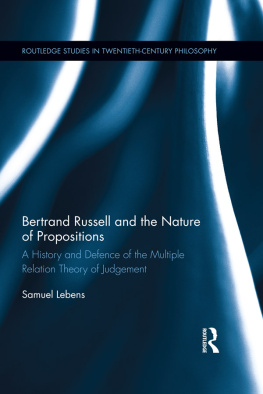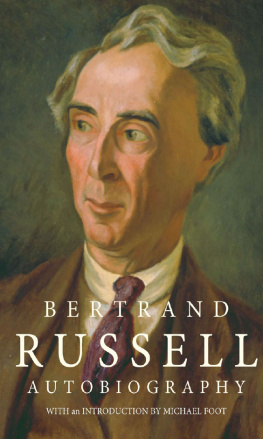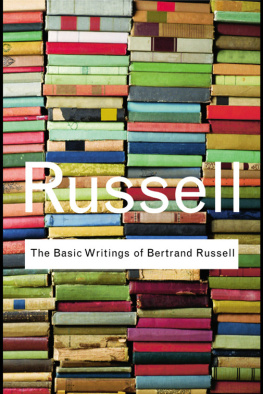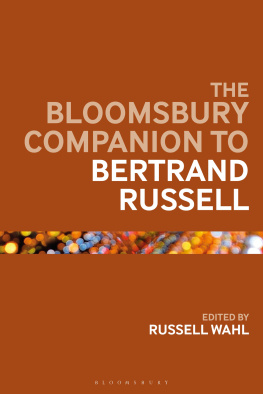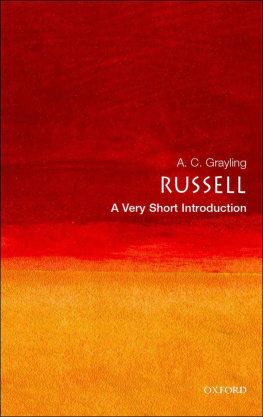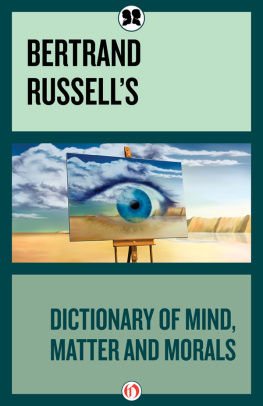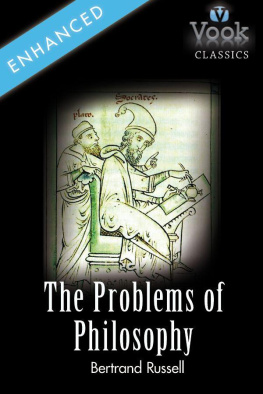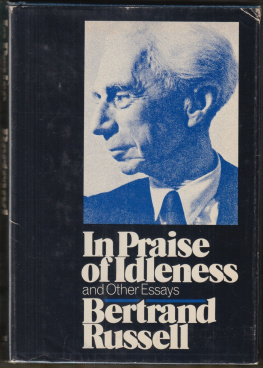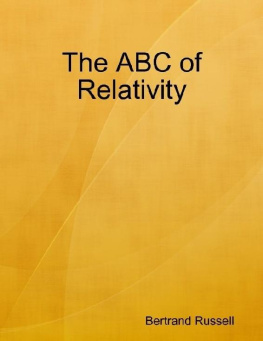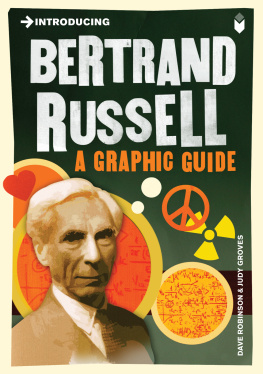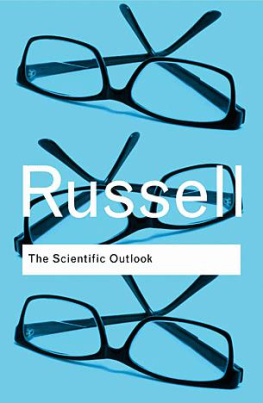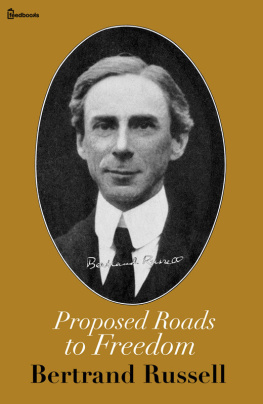Lebens - Bertrand Russell and the Nature of Propositions
Here you can read online Lebens - Bertrand Russell and the Nature of Propositions full text of the book (entire story) in english for free. Download pdf and epub, get meaning, cover and reviews about this ebook. City: London, year: 2017, publisher: Taylor & Francis (CAM), genre: Religion. Description of the work, (preface) as well as reviews are available. Best literature library LitArk.com created for fans of good reading and offers a wide selection of genres:
Romance novel
Science fiction
Adventure
Detective
Science
History
Home and family
Prose
Art
Politics
Computer
Non-fiction
Religion
Business
Children
Humor
Choose a favorite category and find really read worthwhile books. Enjoy immersion in the world of imagination, feel the emotions of the characters or learn something new for yourself, make an fascinating discovery.
Bertrand Russell and the Nature of Propositions: summary, description and annotation
We offer to read an annotation, description, summary or preface (depends on what the author of the book "Bertrand Russell and the Nature of Propositions" wrote himself). If you haven't found the necessary information about the book — write in the comments, we will try to find it.
Lebens: author's other books
Who wrote Bertrand Russell and the Nature of Propositions? Find out the surname, the name of the author of the book and a list of all author's works by series.
Bertrand Russell and the Nature of Propositions — read online for free the complete book (whole text) full work
Below is the text of the book, divided by pages. System saving the place of the last page read, allows you to conveniently read the book "Bertrand Russell and the Nature of Propositions" online for free, without having to search again every time where you left off. Put a bookmark, and you can go to the page where you finished reading at any time.
Font size:
Interval:
Bookmark:
First published 2017
by Routledge
711 Third Avenue, New York, NY 10017
and by Routledge
2 Park Square, Milton Park, Abingdon, Oxon OX14 4RN
Routledge is an imprint of the Taylor & Francis Group, an informa business
2017 Taylor & Francis
The right of Samuel Lebens to be identified as author of this work has been asserted in accordance with sections 77 and 78 of the Copyright, Designs and Patents Act 1988.
All rights reserved. No part of this book may be reprinted or reproduced or utilised in any form or by any electronic, mechanical, or other means, now known or hereafter invented, including photocopying and recording, or in any information storage or retrieval system, without permission in writing from the publishers.
Trademark notice: Product or corporate names may be trademarks or registered trademarks, and are used only for identification and explanation without intent to infringe.
Library of Congress Cataloging-in-Publication Data
A catalog record for this book has been requested
ISBN: 978-1-138-73745-7 (hbk)
ISBN: 978-1-315-18536-1 (ebk)
Typeset in Sabon
by Apex CoVantage, LLC

For a full list of titles in this series, please visit www.routledge.com
35 Wittgenstein and Heidegger
Pathways and Provocations
Edited by David Egan, Stephen Reynolds, and Aaron James Wendland
36 The Textual Genesis of Wittgensteins Philosophical Investigations
Edited by Nuno Venturinha
37 The Early Wittgenstein on Metaphysics, Natural Science, Language and Value
Chon Tejedor
38 Walter Benjamins Concept of the Image
Alison Ross
39 Donald Davidsons Triangulation Argument
A Philosophical Inquiry
Robert H. Myers and Claudine Verheggen
40 Heideggers Shadow
Kant, Husserl, and the Transcendental Turn
Chad Engelland
41 Ernst Jngers Philosophy of Technology
Heidegger and the Poetics of the Anthropocene
Vincent Blok
42 Bertrand Russell and the Nature of Propositions
A History and Defence of the Multiple Relation Theory of Judgement
Samuel Lebens
I was tremendously blessed as a graduate student at Birkbeck College to be surrounded by fabulous teachers and peers. The amount of time and guidance that my supervisors first Fraser MacBride and then Dorothy Edgington gave to me went far beyond what most graduate students receive, and I am so grateful to them. In fact, when I was an undergraduate at University College London, it was Fraser MacBrides lectures on Bertrand Russell (alongside some very engaging tutorials with Colin Johnston) that first drew me in to the Multiple Relation Theory of Judgement.
Susan James and Anthony Price were the faculty that encouraged me to pursue my PhD at Birkbeck. I am so glad that they did. Alongside my official supervisors at Birkbeck, I was fortunate to be able to forge a relationship with Keith Hossack, whose rich work has had a clear impact upon my own. The entire faculty there were truly engaged in creating and sustaining a supportive and invigorating intellectual environment. Furthermore, I was lucky to join Birkbeck alongside a tremendously engaging set of peers. Coffees, seminars and pub-nights with Alex Douglas, Simon Hewitt, Nick Jones, Frederique Lauret and Steven Methven were a major part of my philosophical education and certainly had an impact on the content of this book.
Friendship and conversations with other graduate students in London such as Jonny McIntosh, Arthur Schipper and Lee Walters were also a tremendous resource to me. Facebook has made it possible to take many of these people with me over the course of the intervening years as sources of advice and friendship. Perhaps I should be thanking Mark Zuckerberg. Facebook has also allowed me to have very helpful conversations on the topics of this book with scholars Ive not yet had the pleasure to meet, such as Christopher Menzel and Joseph Jedwab. Many thanks to them and to Lorraine Juliano Keller, a real-life and Facebook friend, who often receives random Facebook messages from me and has been a rich resource of ideas and useful references.
Tom Baldwin and Mark Textor were my PhD examiners and have been a source of encouragement and advice ever since. I am very grateful to both of them.
Returning to professional academia after a four-year hiatus in Rabbinical School wasnt at all easy. It was made possible by a number of people, events and programs that encouraged me to pursue a new research interest in the philosophy of religion. Thanks are particularly due to Kelly Clark, Tyron Goldschmidt, Aaron Segal, Eleonore Stump, Dani Rabinowitz, Mike Rota, Mike Rea and especially Dean Zimmerman (without whom Im pretty certain I wouldnt be in academia today) for making this new chapter of my philosophical career possible.
My various endeavours in the philosophy of religion, over the years, have received generous support from the John Templeton Foundation, the Templeton Religion Trust and the World Templeton Charity Foundation Inc. (the views expressed in this book are not intended to represent the views of any organisation, nor was this research, in particular, funded by them I merely acknowledge that without their support for my research in the philosophy of religion, I may not have remained in professional academia at all). The only real evidence of any philosophy of religion in this book is hidden all the way back in , but at least I managed to sneak some in somewhere!
My return to professional philosophy brought me to the University of Notre Dame and Rutgers University, before my very recent move to the University of Haifa. During this time, I was able to revisit my PhD thesis and bring it up to do date to become this book. A major feature of this process of updating was to bring the thesis more directly into conversation with contemporary philosophers of language. Rutgers, in particular, was a wonderful environment in which to perform such a task.
At Rutgers, I had access to faculty who were very generous with their time, expertise and encouragement. Conversations with Bob Adams, Marilyn McCord Adams, Elisabeth Camp, Jeff King (Jeff Speaks at Notre Dame) and Ernie Lepore were invaluable to me. Andy Egan and Jonathan Schaffer were both kind enough to read long excerpts of my work and give me really helpful comments. What was most remarkable about my time at Rutgers was the invaluable help I received from the graduate students there. Much of the newest material to this book is owed to conversations with David Black, Eddy Kemming Chen, Simon Goldstein, Cameron Domenico Kirk-Giannini and Daniel Rubio. I owe a great debt to all of the graduate students at Rutgers for creating such a wonderful intellectual community to have been a part of, alongside the other research fellows, Andrew Moon and Phil Swenson.
This manuscript was completed during my first semester at the University of Haifa. Even in that short time, I have learnt a tremendous amount from my colleagues here, and I look forward to continuing to work with them in such a warm and conducive intellectual environment. Thanks especially to Michael Anthony, Jonathan Berg, Ariel Meirav and Gil Sagi, who have discussed some of the contents of the book with me, as I was desperately trying to tie up loose ends, and to Saul Smilansky for being such a supportive head of department.
I am honoured to have this book published alongside the other Routledge Studies in Twentieth-Century Philosophy. Indeed, I am very grateful to Andrew Weckenmann, Alexandra Simmons, and their colleagues at Routlege. They have been very encouraging, endlessly helpful and truly professional. The anonymous reviews that Routledge commissioned for this book were insightful and constructive. I extend my thanks to all concerned.
Font size:
Interval:
Bookmark:
Similar books «Bertrand Russell and the Nature of Propositions»
Look at similar books to Bertrand Russell and the Nature of Propositions. We have selected literature similar in name and meaning in the hope of providing readers with more options to find new, interesting, not yet read works.
Discussion, reviews of the book Bertrand Russell and the Nature of Propositions and just readers' own opinions. Leave your comments, write what you think about the work, its meaning or the main characters. Specify what exactly you liked and what you didn't like, and why you think so.

